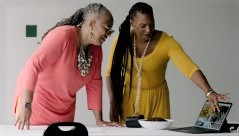AARP Hearing Center
At 62, I started Vivian’s Door as an economic justice nonprofit with a mission to help minority-owned businesses build wealth for themselves and residents of marginalized and underserved communities in Alabama.
The problem I’m trying to solve
Black businesses have suffered unique disadvantages, from economic inequality, redlining, predatory lending and discriminatory banking practices to systemic racism. They lack the cash cushion and intergenerational wealth to endure tough times. The COVID-19 pandemic has pushed them further into decline and created an inescapable economic inequality trap. These businesses lack supportive networks and frequently fall prey to unfair business practices and restrictive laws.
Census data shows an estimated 68,829 firms and employers in Alabama in 2017, with 7,043 (10.2 percent) of these businesses owned by minorities. Yet, Black businesses do not receive a proportionate share of contracts and work opportunities.
Vivian’s Door advances the interests and needs of minority-owned businesses and small farmers in South and Central Alabama through an incubator and accelerator model. We provide opportunities to build a network of low-income businesses, consumers, anchor institutions, large corporate partners and municipal agencies — all working toward a systemic change in community support. We mentor the business owner on needed operational skills, understanding the marketplace and making connections to create long-term success with generational wealth-building. We also provide formal training for participants and a mobile app tool to help these businesses connect to an ecosystem of opportunities and resources.
The moment that sparked my passion
I come from a long line of Black business owners and have been an entrepreneur myself for well over 25 years. Throughout my entrepreneurial journey, I've had success, but I didn't have the success that I thought I should have had based on the business education I’d received. For a long time, I couldn’t put my finger on why. But I realized that there were unique challenges that minority-owned businesses face that other businesses don’t have to deal with.
In 2018, after a dream, I felt called to found Vivian's Door, which is named for civil rights hero Vivian Malone Jones, my husband’s cousin. In 1963, she defied Alabama Gov. George Wallace’s attempts to deny her an education by marching through the doors of the University of Alabama’s School of Commerce and Business Administration with state troopers at her side to become their first Black graduate. I knew that I had to try to get all the partnerships and resources I could to help these disadvantaged businesses.






































































More About AARP's Purpose Prize
Learn about previous winners and fellows
AARP's Purpose Prize FAQ
Read the official rules, eligibility, odds and prize disclosures